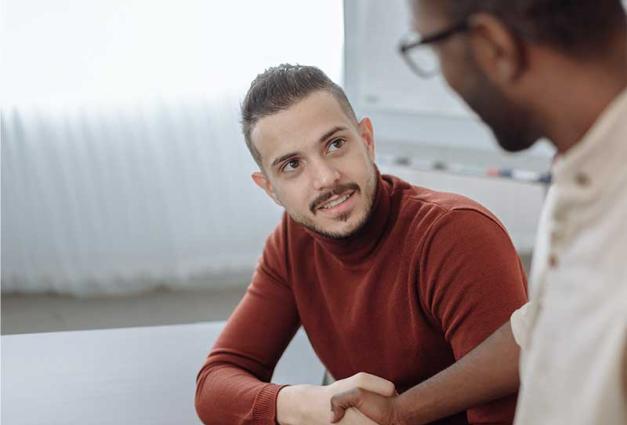If you've ever been on Disneyland's Indiana Jones ride, Temple of the Forbidden Eye, you know not to look into the eyes of the temple god Mara—if you want to make it out in one piece that is. But if you did gaze into the eyes of Mara, what would your first impressions of her be like?
Ok, maybe you wouldn't view an ancient god who is trying to trap you in a crumbling temple as particularly warm, but the research I'm conducting at the University of Maine with my colleagues is showing that gazing into the eyes of a stranger does in fact make them appear warmer and more competent! And wearing a face mask is one way that you can get others to look into your eyes more.
How Face Masks Are Impacting Judgments of Others
In March 2020, our social world became completely different as the World Health Organization declared coronavirus (COVID-19) a pandemic. Almost overnight, people began routinely using masks to cover the entire lower half of their faces, leaving only their eyes exposed. Although this was only intended to prevent the transmission of the widespread COVID-19 virus, it also provided psychologists, including myself, a unique opportunity to investigate how first impressions of strangers may be altered by the presence of a mask.
My colleagues and I did our studies from June 2020 through February 2022 to test how face masks impact first impressions of those wearing them. We first recruited volunteers from around the world to upload two photographs of themselves—one wearing a face mask and one without—to a database we created for this project. For our first two studies, participants from the U.S. viewed and rated photographs of individuals either wearing a face mask or not wearing a face mask. Participants were asked to imagine that they were passing by these people in a grocery store, and to rate their first impressions of these individuals' warmth and competence—the first two impressions individuals generally form when seeing someone for the first time. Participants then answered a series of questions about themselves, such as their political affiliation and how much they believed in the effectiveness of face masks for protection against the transmission of COVID-19.
In both studies, strangers wearing masks were seen as warmer and more competent than the same strangers without face masks. This held regardless of the viewers' political affiliation and regardless of whether they believed in the effectiveness of face masks.
Covering the Mouth, but Enhancing the Eyes
We suspected that these results might have been due to masks enhancing the eyes of those who wear them. The eyes really can be the "window to the soul," as researchers have shown that the eyes can signal valuable information about a person, such as their willingness to form social bonds with you, and their trustworthiness. Gazing into others' eyes also helps you remember their faces better, and helps you better recognize what emotions they are expressing. Therefore, we conducted two more studies to see if first impressions of warmth and competence would increase by simply directing participants' attention to the eyes of others.
For our third study, participants viewed the photographs from our prior studies, but we cropped the bottom half of faces from the top of the nose down out of the picture. For our fourth study, participants were shown the photographs of strangers without face masks and were told to simply gaze into their eyes before making any first impression judgments about them. Just as earlier participants did for individuals wearing masks, these participants rated strangers as warmer and more competent when viewing photos of them with only their eyes showing, or when specifically instructed to look into strangers' eyes, in comparison to neutral photos of strangers without masks.
Forming Positive First Impressions of Others
We are currently living in a time of extreme disconnect, where massive transitions to working from home and rises in smartphone addiction are just some of the factors that appear to be keeping people apart. We find it encouraging that finding ways to look strangers in the eyes more often may actually foster a more positive first impression of them, potentially leading to more satisfying social interactions. As face mask regulations are being pulled back in many places across the globe and we can no longer simply rely on these pieces of clothing to bring out our eyes, taking a moment to look into the eyes of the person who takes your coffee order in the morning may be more impactful than you think.
For Further Reading
Stosic, M. D., Helwig, S., & Ruben, M. A. (2022). More than meets the eyes: Bringing attention to the eyes increases first impressions of warmth and competence. Personality and Social Psychology Bulletin. https://doi.org/10.1177/01461672221128114
Kawakami, K., Williams, A., Sidhu, D., Choma, B. L., Rodriguez-Bailón, R., Cañadas, E., ... & Hugenberg, K. (2014). An eye for the I: Preferential attention to the eyes of ingroup members. Journal of Personality and Social Psychology, 107(1), 1-20. https://doi.org/10.1037/a0036838
Morgan Stosic is a PhD candidate at the University of Maine. Her research interests include the expression and perception of nonverbal behavior, with a focus on how individuals use nonverbal information to make first-impression judgments of others.




